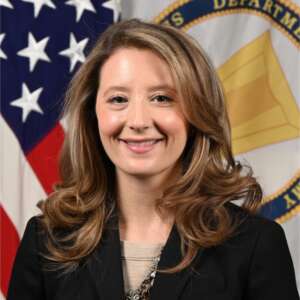

Margaret Boatner, the deputy assistant secretary of the Army for strategy and acquisition reform, said the service will hire as many as 10 experts to help...
The Army’s acquisition office will launch a new group later this year as a way to bring some standardization to how it works with vendors to manage intellectual property rights.
The IP cell of experts, as the Army calls it, will work across all mission areas to help educate and provide hands on assistance to contracting officers as they write solicitations.
Margaret Boatner, the deputy assistant secretary of the Army for strategy and acquisition reform, said the Army plans to hire IP experts this summer and then begin working with acquisition offices across the service.

“One of the problems is that the Army, and broadly the Defense Department, doesn’t have a ton of IP [expertise] within the corps. So we are going to put out some hiring announcements for civilians, but potentially bring on contracted support, leveraging our guard and reserve folks, leveraging academia and industry in creative ways. How can we bring folks on to do that, and so it’ll be a mix of sources that we pull from a mix of functional areas? We’re going to need some legal expertise, some program management, some contracting, some valuation so specifically valuing intellectual property,” Boatner said after speaking at the Armed Forces Communications & Electronics Association Northern Virginia Army IT Day on Jan. 12. “Of course, if they have experience with intellectual property that’s going to be very important as well. It’s a mix of functional areas.”
Congress required DoD to bring on more IP expertise in the 2017 defense authorization bill. The Office of the Secretary of Defense created an IP cadre to work on programs across the department, but Boatner said there just is too much demand for help and not enough experts. To that end, the Army is creating a similar office to focus on its programs and contractors’ needs.
The challenge for DoD, and really all of the military services and defense agencies, has been a lack of consistency in how they address intellectual property with vendors, mainly through contract requirements.
Boatner said at the Army, at least, its approach had been tactical and uncoordinated when it comes to IP.
“It can be very black or white. We either don’t know what IP or level of rights we need so we go after everything, which is costly and can drive our industry partners away,” she said. “Or, we wait until later in the process when we think we have a better idea of what we need, but then risk being locked into sole source arrangement, which can be costly to us. There were legislative changes that forced us into a more nuanced and thoughtful approach to plan earlier for IP requirements in the long term.”
The IP cell of experts aims to break through some of those culture challenges.
“In 2018, the Army put out a policy, which is supposed to help give that standardization. But program offices and contracting officers all have different cultures and different ways of doing it. And even their industry partners, they all approach it differently,” she said. “In addition to the policy and other efforts, this cell is really supposed to help standardize those core principles of kind of balancing the interests between government and industry.”
The IP cell of experts also is trying to address concerns from contractors about IP overreach that could impact the Army’s ability to access innovative technologies.
The Army announced the creation of the cell of experts in October. Gabe Camarillo, the undersecretary of the Army, said the cell will bring “tailored approaches to IP that are appropriate for each individual developmental program, and that are specifically important to each set of technologies that are being developed.”
Boatner said last week the IP cell of experts will include about 10 people to start with a goal of educating acquisition employees as part of a train the trainer model as there are 500 programs across the service.
“We will dispatch them out to certain programs, certain contracts that are riskier or more complex. That’s our initial plan,” she said. “Of course, we hope to prove out value and grow it as much as possible, but it’s going to be dependent on the hiring process, and our ability to actually source the expertise.”
The Army expects the IP cell of experts to reach initial operational capability in fiscal 2023 with hiring of experts starting this summer, and then full operational capability in fiscal 2024.
Boatner said the IP cell, which will be centralized at Army headquarters, will have three responsibilities:
“As we bring people on board and shape the cell, we want to partner with industry to make sure that how we are structuring it is value added to you all as well as to us,” Boatner said. “We think being able to provide this type of additional hands on expertise both to our program and contracting offices but also to our industry partners to have that plug into the government will be helpful to accelerate adoption of this more balanced approach.”
Along with the IP cell of experts, Boatner said her office’s priorities include the continued transformation of software development processes to more agile and iterative, and more broadly streamlining the entire acquisition process to make it more efficient.
“Congress gave us a couple of pathways in the last several years, the middle-tier acquisition software pathway. The Department of Defense has been instituted the adaptive acquisition framework, which is these six pathways. The whole goal is that you tailor to the unique risks of your program and the needs of your program,” she said. “I think we’re continuing to see some of our folks struggle with what tailoring really means and tailoring out some of those documentation requirements, review requirements and processes. We really want to hit hard at under all of this flexibility that we’ve been given, what can we take out and how can we help our program offices in contracting offices feel comfortable accepting that risk and tailoring some of that stuff out when appropriate.”
Copyright © 2025 Federal News Network. All rights reserved. This website is not intended for users located within the European Economic Area.
Jason Miller is executive editor of Federal News Network and directs news coverage on the people, policy and programs of the federal government.
Follow @jmillerWFED


